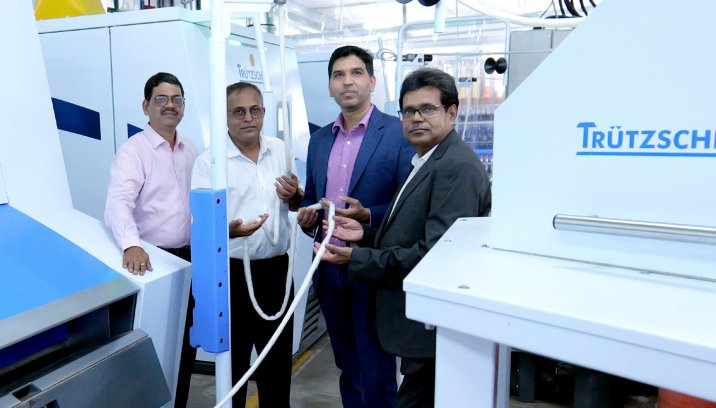
More options with Recycrom for denim
Shortening the spinning process by eliminating draw frame passages.

28th August 2024
Innovation in Textiles
|
India
India’s Gimatex Industries is now turning textile waste into valuable ring yarns using Truetzschler’s integrated draw frame (IDF) and associated equipment.
Gimatex operates fully integrated facilities with ginning, spinning, recycling, weaving and processing units in Hinganghat, in India’s major cotton-growing region of Vidarbha. It also runs a state-of-the art fabric processing unit in Dholka, near Ahmedabad. Since 2006, the family-owned company has collaborated with the German machine builder on many projects.
“Our clients demand consistent quality and competitive prices,” says Gimatex director Vineet Mohota. “We meet those demands by always leveraging the latest technologies to boost quality, save energy and make progress for sustainability and Truetzschler is a strong partner in this work.”
Gimatex mainly uses the Truetzschler IDF to manufacture rotor yarns in a direct spinning process – shortening the spinning process by eliminating draw frame passages. Fibre slivers are fed directly from the card into the integrated drafting passage. This direct spinning concept uses less electricity and less space than conventional draw frame passages, which helps Gimatex to cut costs while increasing output volumes with no compromise in quality.
The team at Gimatex has now become one of the first spinning mills in India to develop a special IDF process for producing traditional and recycled ring yarn, using the same setup it employs for open-end yarn.
The ring yarn produced in this unusual way consists of mostly coarser varieties of fibre and blends in cotton/spandex in Ne 10s and Ne 16s.
The yarn goes through a blow room into a TC 15 card with IDF, before entering a Truetzschler TD 10 draw frame, a speed frame and a ring frame.
“The performance of Truetzschler’s IDF machines is great,” says Mohota. “We also get support from Truetzschler’s expert teams. They’re always available to give guidance and answer questions, and they’re able to access data from around the globe to share best practices for every application. As market conditions in India continue to evolve, we will keep working hand in hand to adapt to change successfully – while meeting the high expectations of our customers.”

Business intelligence for the fibre, textiles and apparel industries: technologies, innovations, markets, investments, trade policy, sourcing, strategy...
Find out more